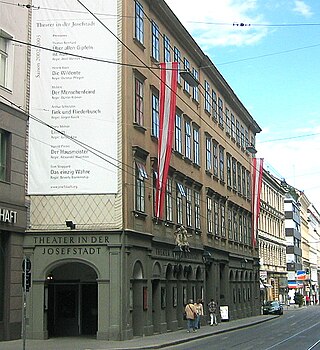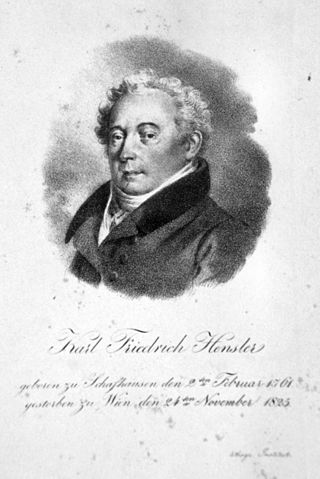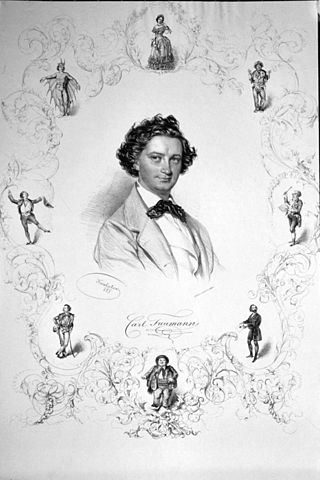Related Research Articles

Johann Nepomuk Eduard Ambrosius Nestroy was a singer, actor and playwright in the popular Austrian tradition of the Biedermeier period and its immediate aftermath. He participated in the 1848 revolutions and his work reflects the new liberal spirit then spreading throughout Europe.

The Theater in der Josefstadt is a theater in Vienna in the eighth district of Josefstadt. It was founded in 1788 and is the oldest still performing theater in Vienna. It is often referred to colloquially as simply Die Josefstadt.

Alexander Girardi was an Austrian actor and tenor singer in operettas.

Karl Friedrich Hensler was a dramatist and theatre manager in Vienna.

Matthias Karl Ludwig Treumann was an Austrian actor, operetta singer (tenor), theatre director and writer.

Wenzel Johann Scholz was an Austrian actor in Laibach, Klagenfurt, Graz and in Vienna above all at the Alt-Wiener Volkstheater, who became known especially as brilliant partner of Johann Nestroy in his posses and Lustspiels.

Josefine Gallmeyer was an Austrian actress and theatre director of German origin.
Caroline Friederike Wilhelmine Demmer was a German-Austrian actress and singer.
Thekla Kneisel, néeThekla Demmer was an Austrian actress and operatic mezzosoprano as well as a soubrette. She came from the actors family Krüger-Demmer and died at the age of 30 after a successful stage career in Vienna lasting only 15 years.

Adolf Bäuerle (real name Johann Andreas Bäuerle was an Austrian writer, publisher and main representative of the Alt-Wiener Volkstheater.

Karl Haffner (pseudonym), real name Karl Schlechter, was a German dramaturge.
Josef Kilian Schickh was an Austrian playwright who wrote mainly fairy tales, lokalposse and parodies for the Alt-Wiener Volkstheater, one of the three Wiener Vorstadttheater. He was the nephew of the journalist Johann Schickh and a contemporary of Johann Nestroy, Karl Meisl, Josef Alois Gleich and Franz Xaver Told.

Adolf Müller Sr. was a composer from the Austrian Empire and late Austria-Hungary. After an early career as an actor and singer, he composed operettas for theatres in Vienna.

Ludwig Speidel was a German writer, which in the second half of the 19th century was the leading music, theater and literary critic in Vienna.

Carl Karlweis, originally Karl Weiss was an Austrian dramatist and short story writer. Of Jewish ancestry, he converted to Protestantism in 1889.
Josef Alois Gleich was an Austrian civil servant, and a prolific dramatist and novelist.

Anton Hasenhut was an Austrian comic actor, known particularly for the character Thaddädl. He was in the theatre company of Karl von Marinelli and later of Emanuel Schikaneder.

Joseph Drechsler was an Austrian organist, teacher, composer and conductor; in Vienna he was organist and choirmaster at several churches, and theatre conductor and composer of incidental music.
Johann August Stöger was an Austrian operatic tenor and later a theatre manager, leasing theatres in Vienna and Prague.
Zauberspiel or Zauberstück is a German-language work for the stage that has magic characters or magic action, or both.
References
- 1 2 3 Anton Schlossar (1906), "Meisl, Karl", Allgemeine Deutsche Biographie (in German), vol. 52, Leipzig: Duncker & Humblot, pp. 305–307
- 1 2 Wurzbach, Constantin von, ed. (1867). . Biographisches Lexikon des Kaiserthums Oesterreich [Biographical Encyclopedia of the Austrian Empire] (in German). Vol. 17. p. 284 – via Wikisource.
- ↑ "Meisl, Karl (1775–1853), Schriftsteller" Oesterreichisches Biographisches Lexikon. Retrieved 28 July 2019.
- ↑ Paul Nettl. Beethoven Encyclopedia. Philosophical Library, New York, 1956. Entries "Meisl, Karl" and "Hensler, Karl Friedrich".